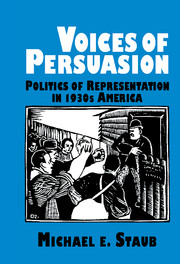Book contents
- Frontmatter
- Contents
- Acknowledgments
- Preface
- 1 Spoken Testimony, Unwritten History
- 2 John Dos Passos and James Agee: You Won't Hear It Nicely
- 3 John Neihardt, William Benson, and Ruth Underhill: Telling Native American History
- 4 Zora Neale Hurston: Talking Black, Talking Back
- 5 Tillie Olsen and the Communist Press: Giving the People Voice
- Notes
- Bibliography
- Index
- CAMBRIDGE STUDIES IN AMERICAN LITERATURE AND CULTURE
4 - Zora Neale Hurston: Talking Black, Talking Back
Published online by Cambridge University Press: 22 March 2010
- Frontmatter
- Contents
- Acknowledgments
- Preface
- 1 Spoken Testimony, Unwritten History
- 2 John Dos Passos and James Agee: You Won't Hear It Nicely
- 3 John Neihardt, William Benson, and Ruth Underhill: Telling Native American History
- 4 Zora Neale Hurston: Talking Black, Talking Back
- 5 Tillie Olsen and the Communist Press: Giving the People Voice
- Notes
- Bibliography
- Index
- CAMBRIDGE STUDIES IN AMERICAN LITERATURE AND CULTURE
Summary
IN 1925, Professor Howard W. Odum, author of numerous widely respected scholarly articles and books on black folklore, described a black chain gang as it worked and sang outside his home in Georgia. He had thought the workers “oblivious” to his presence. So he sat on a rock wall and attempted to write down their work songs. This is what he heard:
White man settin' on wall,
White man settin' on wall,
White man settin' on wall all day long,
Wastin' his time, wastin' his time.
The moment's irony encapsulates much of the troubled history of writing black speech in the United States in the early twentieth century. While the 1920s and 1930s witnessed intensive investigations into and fascination with the folkways of black Americans, few who recorded black speech were themselves black.
The most remarkable exception to this rule was Zora Neale Hurston. As an ethnographer, folklorist, and documentarian starting out in the late 1920s, Hurston confronted a reading public attuned to the Uncle Remus tales of Joel Chandler Harris, as well as the “poetic sociologies” of other white collectors of black folklore, including Odum, Julia Peterkin, Roark Bradford, and DuBose Hey ward. But as Hurston's biographer Robert Hemenway comments, “white collectors, no matter how earnest, liberal, kind, sympathetic, and well meaning, were always – by definition of race – outsiders looking in.” By contrast, as a southern black woman collecting southern black folklore, Hurston faced her own particular problem, that is, “by definition of race,” she was an insider looking out, for she consciously sought and addressed a wider white audience.
- Type
- Chapter
- Information
- Voices of Persuasion , pp. 79 - 109Publisher: Cambridge University PressPrint publication year: 1994



